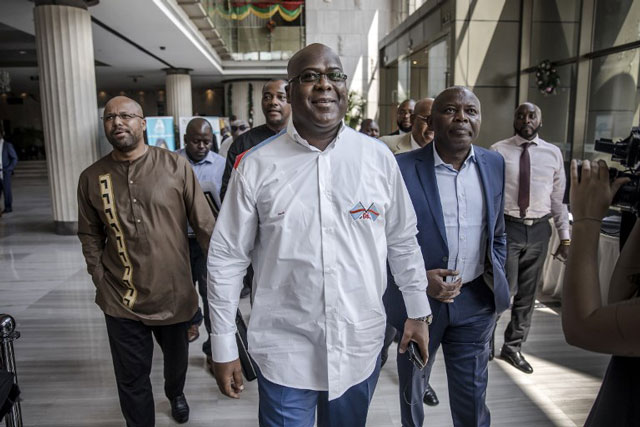
Kinshasa, DR Congo | AFP | The outcome of DR Congo’s tempestuous presidential election appeared to be headed for the courts Friday after the poll’s runner-up said he would demand a recount.
Martin Fayulu, an opposition candidate tipped by pollsters as the likely winner of the December 30 vote, told supporters: “We will go to the Constitutional Court on Saturday… (to demand) a recount of the vote.”
He said he would challenge Corneille Nangaa, head of the Independent National Election Commission (CENI), “to produce the tally reports from polling stations in front of witnesses” and Congolese and international observers.
Provisional results released on Thursday gave Felix Tshisekedi, a rival opposition candidate, 38.57 percent of the vote, just ahead of Fayulu with 34.8 percent.
Emmanuel Ramazani Shadary, the candidate backed by outgoing President Joseph Kabila, came a distant third with 23.8 percent.
The declared result was a surprise to many.
The few pre-election opinion polls had flagged Fayulu as clear favourite while Kabila critics predicted an outcome rigged in favour of Shadary.
The powerful Roman Catholic church bluntly said CENI’s provisional result “does not correspond” with data that its 40,000 election monitors had collected at polling stations.
Fayulu’s bloc on Friday said he was the true victor, claiming he had garnered 61 percent of the vote.
Candidates have 48 hours after the result to file any appeal, and the Constitutional Court has a week in which to deliberate.
“We don’t expect the election to be annulled, but (a decision in favour of) a recount,” Fayulu said.
– Unstable giant –
Democratic Republic of Congo has been in the grip of a two-year political crisis triggered by Kabila’s refusal to step down when his two-term constitutional limit expired at the end of 2016.
Elections to choose a successor were delayed three times before finally taking place on December 30.
Polling day unfolded relatively peacefully, but suspicions over the count have deepened.
The turmoil has darkened hopes that the country will have its first peaceful handover of power since it gained independence in 1960.
International reactions to the results have been guarded.
Most leaders issued statements calling for any disputes to be resolved peacefully, but notably lacking any congratulations for Tshisekedi.
Competing appeals in the dispute were pitched to the UN Security Council on Friday.
CENI chief Nangaa, speaking by video conference, pleaded for “the new authorities to be supported by the international community”.
 The Independent Uganda: You get the Truth we Pay the Price
The Independent Uganda: You get the Truth we Pay the Price





